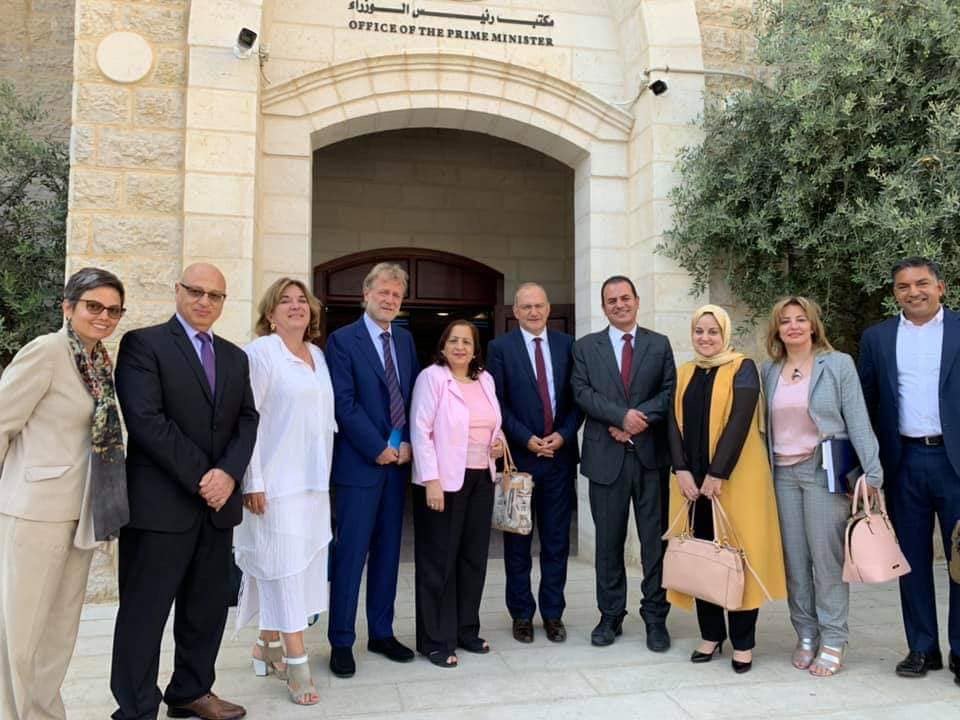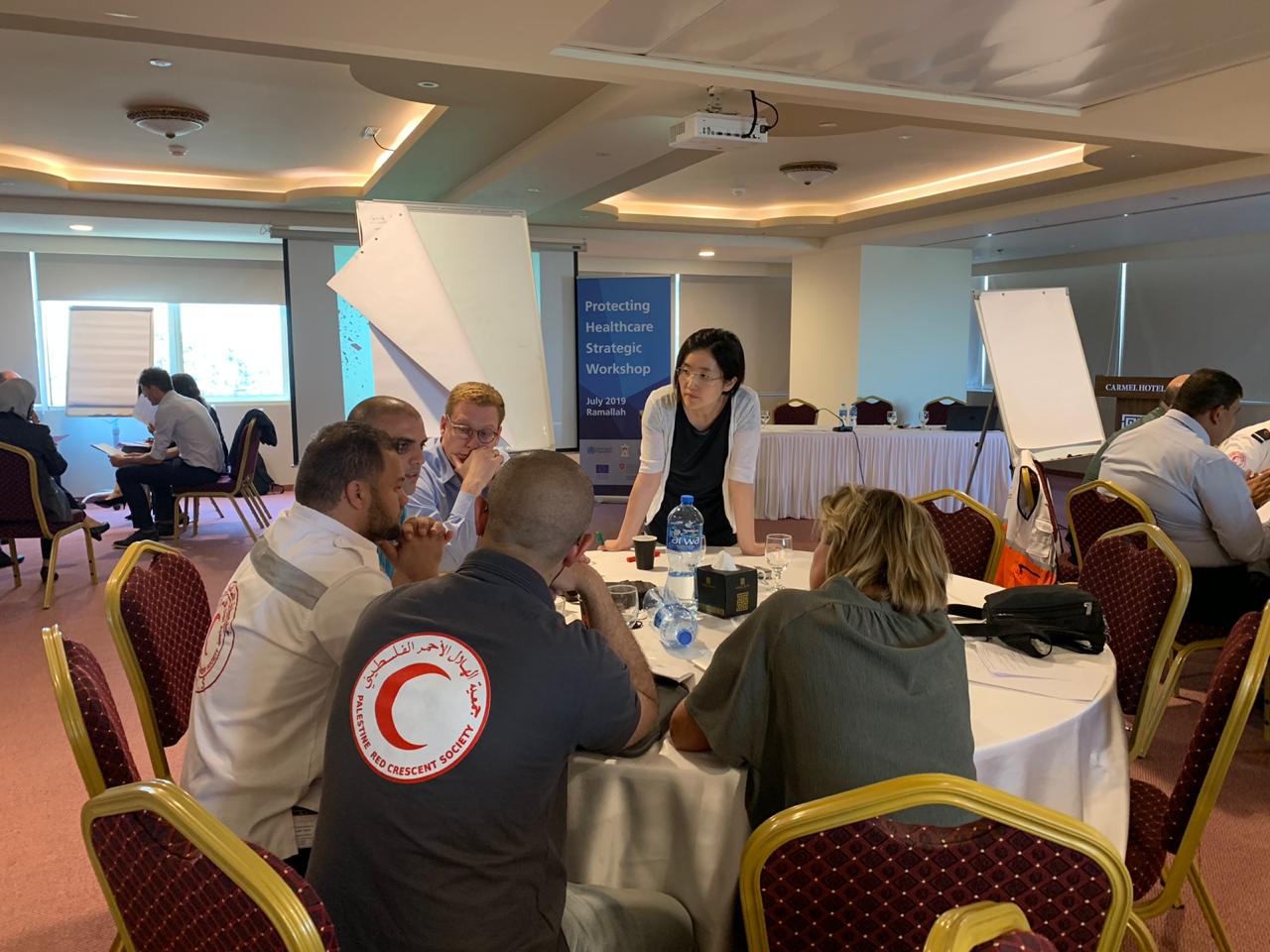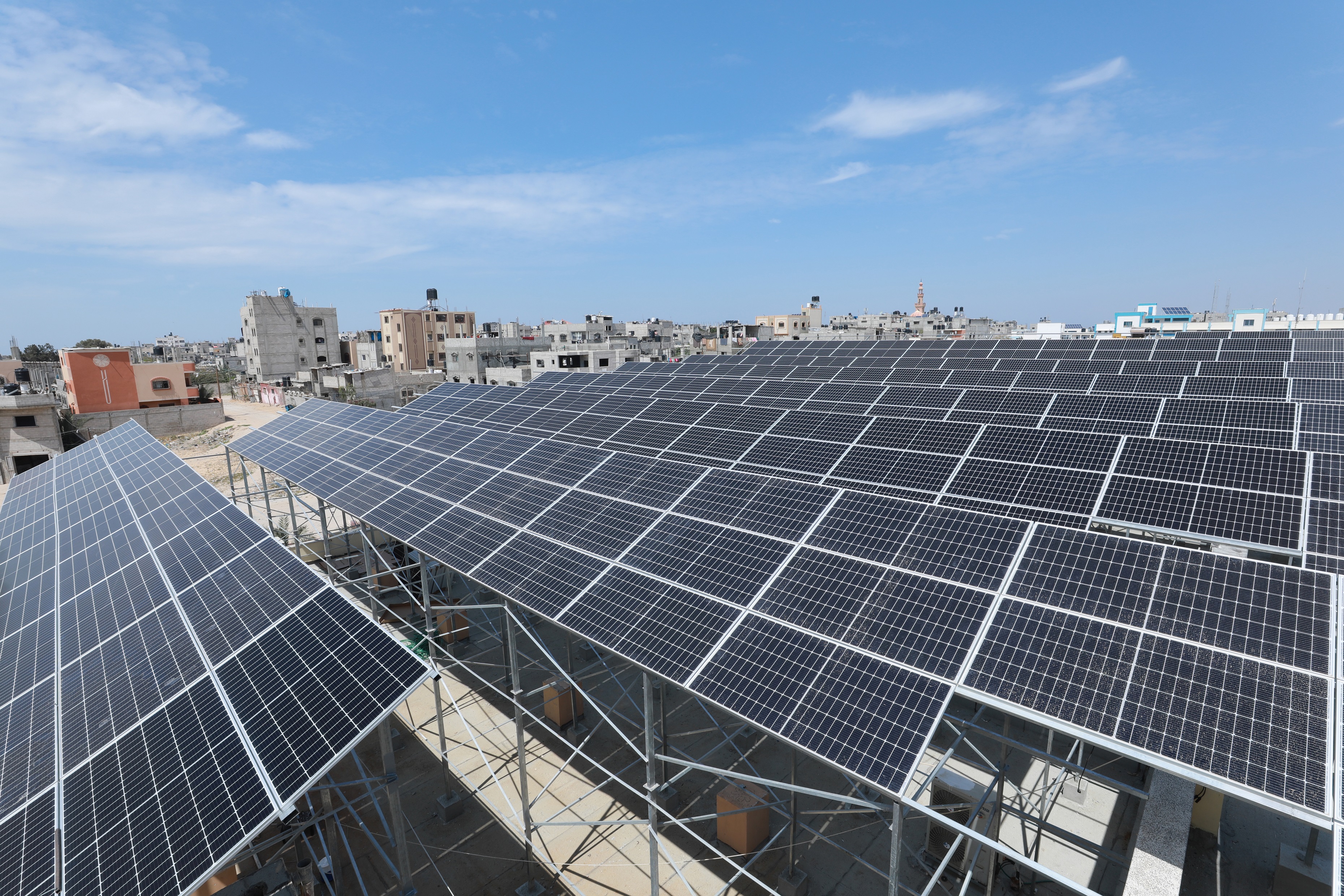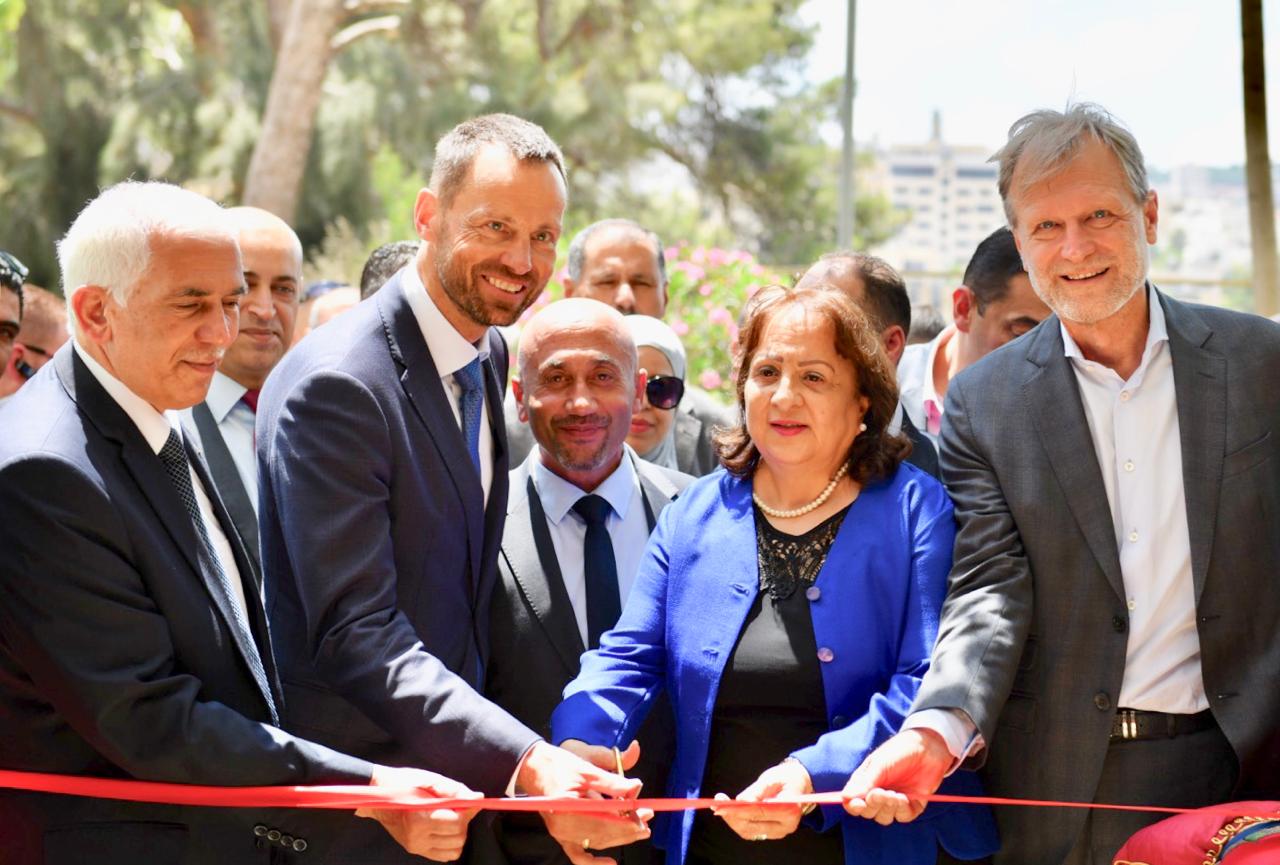Strengthening universal health coverage in the occupied Palestinian territory
 WHO high-level expert mission with Minister of Health Dr Al-Kaila4 September 2019 – The World Health Organization (WHO), at the request of the Prime Minister, conducted a high-level expert mission to the occupied Palestinian territory to support the Ministry of Health and partners in accelerating efforts towards universal health coverage (UHC). WHO experts reviewed the current status of UHC to advise on strategic options to strengthen health system capacities with an emphasis on health service delivery and sustainable financing.
WHO high-level expert mission with Minister of Health Dr Al-Kaila4 September 2019 – The World Health Organization (WHO), at the request of the Prime Minister, conducted a high-level expert mission to the occupied Palestinian territory to support the Ministry of Health and partners in accelerating efforts towards universal health coverage (UHC). WHO experts reviewed the current status of UHC to advise on strategic options to strengthen health system capacities with an emphasis on health service delivery and sustainable financing.
“At WHO we are committed to helping everyone, everywhere get the health services they need, close to home,” said Dr Peter Salama, Executive Director for UHC and the Lifecourse at WHO. “It is encouraging to see this growing commitment to UHC in the occupied Palestinian territory and we look forward to working alongside all our partners here to make it a reality.”
“The key pillar of universal health coverage is a strong health system. WHO will use the momentum of the mission to develop an action plan with the Ministry of Health and partners to strengthen health system capacities to deliver quality services that are tailored to meet people’s needs,” says Dr Gerald Rockenschaub, head of WHO’s office for the occupied Palestinian territory. “Building on the strong commitment from partners and key stakeholders, there are new opportunities to put Palestine on a trajectory towards achieving Health for All.”
The mission presented the initial findings to Prime Minister Dr Shtayyeh and Minister of Health Dr Al-Kaila, who reiterated their commitment to advance universal health coverage and the health-related Sustainable Development Goals.
WHO will work with government officials, civil society, nongovernmental organizations and United Nations partners to collectively develop a roadmap to accelerate efforts towards UHC, to improve health and well-being. A special focus will be on strengthening primary health care through the roll out of the family practice approach, continuous quality improvement of services, evidence-based health services planning, and health financing reform with an emphasis on sustainable health financing and social health insurance.
Related links
WHO, Ministry of Health and OHCHR strengthen protection of healthcare in the occupied Palestinian territory
 An ambulance attacked in Gaza during the Great March of Return demostrations. Photo: WHO12 July 2019, oPt - The World Health Organization (WHO) is working with the Palestinian Ministry of Health, Office of the United Nations High Commissioner for Human Rights (OHCHR), and other health and human rights partners to strengthen the protection of healthcare in the occupied Palestinian territory (oPt). With financial support from the European Union and the Swiss Agency for Development and Cooperation, two workshops to identify key strategic interventions and good practices for better protection of healthcare took place in Gaza and Ramallah in July 2019.
An ambulance attacked in Gaza during the Great March of Return demostrations. Photo: WHO12 July 2019, oPt - The World Health Organization (WHO) is working with the Palestinian Ministry of Health, Office of the United Nations High Commissioner for Human Rights (OHCHR), and other health and human rights partners to strengthen the protection of healthcare in the occupied Palestinian territory (oPt). With financial support from the European Union and the Swiss Agency for Development and Cooperation, two workshops to identify key strategic interventions and good practices for better protection of healthcare took place in Gaza and Ramallah in July 2019.
There has been an unprecedented number of attacks on healthcare in the occupied Palestinian territory, and particularly in Gaza since the start of the Great March of Return. From 30 March 2018 to the end of June 2019, WHO recorded 577 attacks on healthcare, in which 4 health workers were killed and 793 injured. As a result of these attacks, 125 ambulances were damaged and 22 health facilities were affected.
“These numbers are unacceptable. Health attacks deprive people of urgently needed care, put the lives of health workers in danger, and undermine health systems,” says Dr Gerald Rockenschaub, head of WHO’s office for the occupied Palestinian territory. “Collectively, we need to enhance efforts to ensure that health staff in the occupied Palestinian territory can deliver services in a safe and protected environment, so that patients have unimpeded access. Health care must never be a target.”
Representatives from the Palestinian Ministry of Health, UN agencies, local and international nongovernmental organizations, health workers and partners participated in the workshops. They reviewed ways to improve monitoring and explored strategies to prevent violence and better protect healthcare.
 Group discussion during the workshop in Ramallah. Photo credit: WHO“This workshop brings together people from different fields: those working on advocacy and directly on the ground, those documenting violations, UN agencies, diplomats. It’s a great opportunity to have all these different actors come together and for us learn from each other and exchange ideas,” says Rania Muhareb, a legal researcher from a Palestinian human-rights organization. “This workshop comes in the context of increased violations, killings and attacks. There is a real need for protection on the ground.”
Group discussion during the workshop in Ramallah. Photo credit: WHO“This workshop brings together people from different fields: those working on advocacy and directly on the ground, those documenting violations, UN agencies, diplomats. It’s a great opportunity to have all these different actors come together and for us learn from each other and exchange ideas,” says Rania Muhareb, a legal researcher from a Palestinian human-rights organization. “This workshop comes in the context of increased violations, killings and attacks. There is a real need for protection on the ground.”
Building on the workshops, WHO, the Ministry of Health, OHCHR and partners aim to develop a joint strategy to improve collective efforts for the protection of healthcare in the occupied Palestinian territory.
Powering health: WHO brings solar energy to the health sector in Gaza
 The solar power plant at Nasser Hospital in Gaza. Credit: WHO17 June 2019, Gaza - The World Health Organization (WHO) and implementing partners inaugurated the newly installed solar power plant at Nasser hospital in the Gaza Strip. Funded by the Government of Japan, the solar plant as a source of alternative energy will reduce the reliance of the hospital on donated fuel for emergency generators and contribute to build resilience of critical departments providing life-saving interventions.
The solar power plant at Nasser Hospital in Gaza. Credit: WHO17 June 2019, Gaza - The World Health Organization (WHO) and implementing partners inaugurated the newly installed solar power plant at Nasser hospital in the Gaza Strip. Funded by the Government of Japan, the solar plant as a source of alternative energy will reduce the reliance of the hospital on donated fuel for emergency generators and contribute to build resilience of critical departments providing life-saving interventions.
Annually, the 250 KWp solar plant, providing 420 MWh of clean energy, is expected to save around 166,000 litres of fuel and reduce CO2 emissions by 185 tons. It will also improve the availability of essential health services for an estimated 19,000 people per month.
“Interruptions in energy supply have created an enormous challenge for the health sector in Gaza, putting lives of the most vulnerable patients at risk. The solar electrification of Nasser Hospital is an important step towards ensuring more sustainable power supply to health facilities,” says Dr Gerald Rockenschaub, head of WHO’s office for the occupied Palestinian territory. “We are grateful to the Government of Japan for funding this initiative that also contributes to building a more resilient health system and environmental sustainability in Gaza.”
The Government of Japan provided US$ 500,000 to WHO to implement the solar electrification project in order to meet the needs of the wider population, with a specific focus on the refugees and internally displaced people (IDPs) in Gaza.
“We believe that through this project, Japan will contribute to strengthening the linkages between humanitarian responses and longer-term development plans to achieve sustainability in the health sector. The solar electrification project will reduce the risk of preventable mortality of newborns, intensive care patients and patients requiring hemodialysis,” says Mr. Takeshi Okubo, Representative of Japan to Palestine. “In addition, we know that the outcome of this project will go beyond its timeframe; more patients will likely benefit from this intervention in the future.”
Gaza has been affected by chronic electricity shortages for years, which severely compromise the provision of basic health services. As a result, the hospitals in the Gaza Strip have to rely on backup generators to sustain critical life-saving services when electricity is unavailable from the mains grid supply. Since the start of 2018, the international community has collectively donated $4 million USD for emergency fuel to sustain Gaza’s critical health facilities. According to OCHA, 4.29 million litres of fuel were provided to Gaza’s health sector to support 80 health facilities.
Power interruptions affect the functionality of health facilities and hospitals, jeopardizing essential services, including intensive care, haemodialysis, operating theatres and pharmaceutical and vaccine storage. To reduce the impact of the electricity crisis on patients, WHO and health cluster partners have been working to mobilize resources to provide main public hospitals with alternative energy sources.
Solar electrification can effectively contribute to decrease the dependence of hospitals on emergency generators. To ensure full energy resilience of hospitals and the broader health sector, a comprehensive approach to the provision of sustainable energy supply and further investments in upgrading the electricity supply infrastructure for the Gaza Strip are needed.
For more information, please contact:
Olha Izhyk
email:
The closing ceremony of the mental health project in the occupied Palestinian territory
 Opening of the renovated acute male ward facility in Bethlehem Psychiatric Hospital. Credit:WHO13 June 2019, Bethlehem – The Palestinian Minister of Health Dr Mai Alkaila and representatives from the European Union (EU) and from the World Health Organization (WHO) marked the ending of WHO’s project “Building Palestinian Resilience: Improving Psycho-Social and Mental Health responses to emergency situations” in the occupied Palestinian territory.
Opening of the renovated acute male ward facility in Bethlehem Psychiatric Hospital. Credit:WHO13 June 2019, Bethlehem – The Palestinian Minister of Health Dr Mai Alkaila and representatives from the European Union (EU) and from the World Health Organization (WHO) marked the ending of WHO’s project “Building Palestinian Resilience: Improving Psycho-Social and Mental Health responses to emergency situations” in the occupied Palestinian territory.
The project, funded by the EU since 2016, supported the Ministry of Health in its efforts to reform mental health services by scaling up community mental health services, integrating mental health into primary and secondary care, and strengthening coordination and mental health emergency preparedness and response capacities.
“Mental health is an integral part of health; in fact, there is no health without mental health. The political violence in Palestine creates an important psychological morbidity and, thus, it is a priority for the ministry of health to respond to this by expanding our mental health services and build professional capacities and skills. Palestinians are a very young population, and young people growing in a violent context are at a special risk to be affected by mental health problems; our future priority is to develop accessible, specialized mental health services for children and adolescents all over Palestine. We appreciate our partnership with the EU and the WHO and we are looking forward for further future collaboration,” stated Dr Mai Alkaila, Minister of Health.
The project successfully facilitated the integration of mental health services into primary health care, covering Ministry of Health and UNRWA clinics in Gaza and the West Bank through the Mental Health Gap Action Programme (mhGAP) - a global WHO approach for scaling up services for mental, neurological, and substance use disorders. Almost 1,600 people were trained on the full range of mental health and psychosocial support (MHPSS) services, including on school mental health counselling, common mental health disorders, rehabilitation, and development of training programmes for general hospital staff.
“Mental health and psychosocial problems, linked to chronic occupation and closure, are a significant public health challenge across the occupied Palestinian territory. Thanks to the continued partnership with the EU, through this project we were able to support the Ministry of Health and UNRWA to enhance the capacity of mental health services, to renovate selected facilities, and to strengthen community-based mental health interventions,” said Dr Gerald Rockenschaub, head of WHO’s office for the occupied Palestinian territory. “We will continue to work with the Ministry and health partners to ensure access to quality mental health services and psychosocial interventions as essential part of our collective efforts to progress towards Universal Health Coverage.”
We are proud of supporting this significant project aimed at providing mental health services and psycho social support in Palestine. For many years now, the Palestinian population has been living under difficult circumstances leading to all sorts of physical and mental complications and problems. It is our joint responsibility, together with the Palestinian Authority and the World Health Organisation, to address the health needs of every Palestinian. This is our approach to make sure we leave no one behind. And this is our vision for a better future for Palestinians and the coming generations," said the Deputy EU Representative, Tomas Niklasson.
Major achievements of the project include the development of a mental health emergency response plan for Gaza, training of emergency mental health teams and procurement of essential psychotropic drugs and supporting infrastructure renovation efforts and rehabilitation at the Bethlehem Psychiatric Hospital. Moreover, the project initiated the establishment of mental health liaison units at four general hospitals in the West Bank, two in Gaza and one in East Jerusalem. Mental health liaison units are specialist services providing mental health care in general hospitals and consist of skilled teams who assess and manage mental health problems of patients treated in general hospitals. However, there is still the need to further work on the development of mental health services, like consolidating efforts to ensure full integration of mental health into service provision at all levels, development of psychosocial rehabilitation and school mental health programmes.
For further information, please contact:
Rajiah Abu Sway
Tel: 00972547179037
email:








